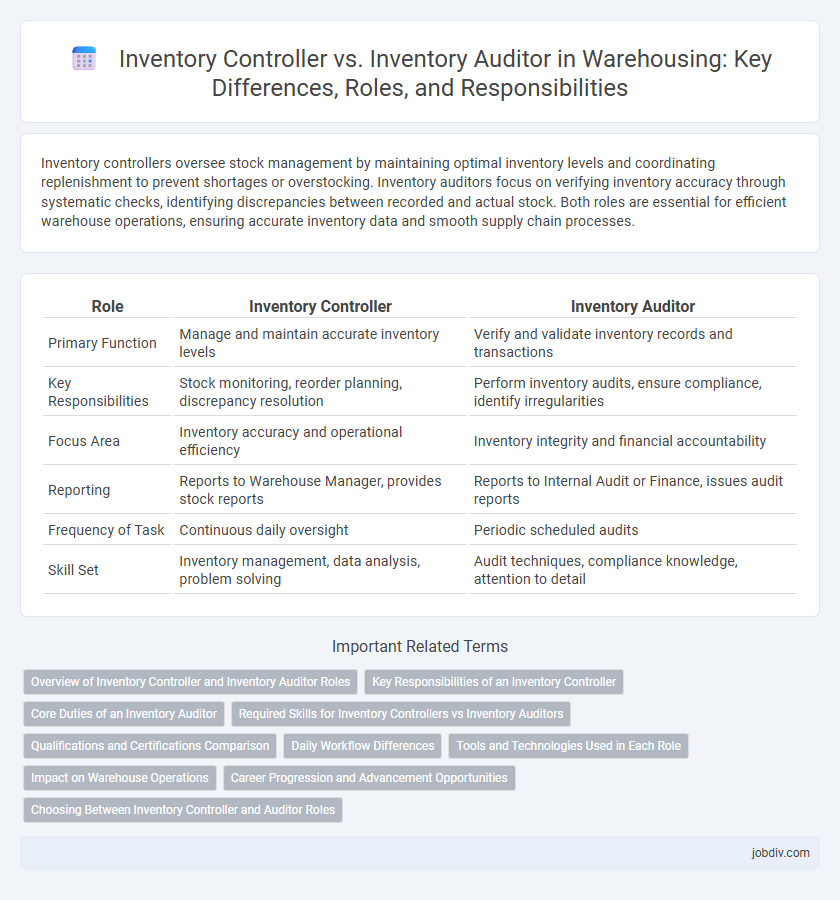Inventory controllers oversee stock management by maintaining optimal inventory levels and coordinating replenishment to prevent shortages or overstocking. Inventory auditors focus on verifying inventory accuracy through systematic checks, identifying discrepancies between recorded and actual stock. Both roles are essential for efficient warehouse operations, ensuring accurate inventory data and smooth supply chain processes.
Table of Comparison
| Role | Inventory Controller | Inventory Auditor |
|---|---|---|
| Primary Function | Manage and maintain accurate inventory levels | Verify and validate inventory records and transactions |
| Key Responsibilities | Stock monitoring, reorder planning, discrepancy resolution | Perform inventory audits, ensure compliance, identify irregularities |
| Focus Area | Inventory accuracy and operational efficiency | Inventory integrity and financial accountability |
| Reporting | Reports to Warehouse Manager, provides stock reports | Reports to Internal Audit or Finance, issues audit reports |
| Frequency of Task | Continuous daily oversight | Periodic scheduled audits |
| Skill Set | Inventory management, data analysis, problem solving | Audit techniques, compliance knowledge, attention to detail |
Overview of Inventory Controller and Inventory Auditor Roles
Inventory Controllers manage and oversee stock levels to ensure accurate record-keeping and efficient supply chain operations within warehouses. Inventory Auditors conduct thorough examinations of physical inventory against records to identify discrepancies, ensure compliance with accounting standards, and maintain data integrity. The Inventory Controller focuses on day-to-day inventory accuracy and replenishment, while the Inventory Auditor emphasizes verification and accountability through detailed audits.
Key Responsibilities of an Inventory Controller
An Inventory Controller primarily manages stock levels, ensures accurate record-keeping, and coordinates with suppliers and warehouse staff to prevent discrepancies. They monitor inventory flow, implement control systems, and perform regular cycle counts to maintain optimal stock accuracy. Unlike Inventory Auditors who focus on inspecting and verifying stock records, Inventory Controllers are responsible for daily operational management and maintaining inventory integrity.
Core Duties of an Inventory Auditor
An Inventory Auditor primarily verifies the accuracy and integrity of inventory records through systematic physical counts and audit trails, ensuring compliance with company policies and regulatory standards. They identify discrepancies, investigate causes of stock variances, and recommend corrective actions to prevent future errors. Their core duties include performing regular audits, documenting findings, and collaborating with inventory controllers to maintain accurate stock data and optimize warehouse operations.
Required Skills for Inventory Controllers vs Inventory Auditors
Inventory Controllers require strong analytical skills, proficiency in inventory management software, and expertise in demand forecasting to maintain accurate stock levels and optimize storage efficiency. Inventory Auditors must possess keen attention to detail, in-depth knowledge of auditing standards, and expertise in identifying discrepancies or compliance issues within inventory records. Both roles demand effective communication and problem-solving skills, but Inventory Controllers focus more on operational control while Auditors emphasize validation and compliance.
Qualifications and Certifications Comparison
Inventory Controllers typically possess certifications such as Certified Inventory Specialist (CIS) or certifications in supply chain management like APICS CPIM, emphasizing expertise in inventory planning and stock optimization. Inventory Auditors often hold qualifications in auditing and compliance, including Certified Internal Auditor (CIA) or Certified Information Systems Auditor (CISA), highlighting skills in verifying inventory accuracy and regulatory adherence. Both roles require strong analytical abilities, but Inventory Controllers focus more on operational control while Inventory Auditors prioritize accuracy verification and audit compliance.
Daily Workflow Differences
Inventory Controllers focus on managing stock levels, conducting regular cycle counts, and updating inventory databases to ensure accurate real-time tracking. Inventory Auditors perform periodic inspections, verify transaction records, and assess compliance with internal controls to identify discrepancies or fraud. While Controllers maintain ongoing inventory accuracy through daily operational oversight, Auditors conduct detailed evaluations to validate inventory integrity typically on a scheduled basis.
Tools and Technologies Used in Each Role
Inventory Controllers utilize advanced warehouse management systems (WMS) like SAP EWM and Oracle WMS to maintain real-time stock accuracy, employing barcode scanners and RFID technology for efficient tracking. Inventory Auditors leverage auditing software such as AuditBoard and IDEA, alongside data analytics tools, to perform thorough inventory verification and identify discrepancies. Both roles integrate automation and cloud-based platforms, but Controllers emphasize day-to-day inventory optimization, while Auditors focus on compliance and audit trail validation.
Impact on Warehouse Operations
Inventory Controllers maintain accurate stock levels by managing ordering, receiving, and storage processes, directly enhancing warehouse efficiency and reducing stockouts. Inventory Auditors systematically verify inventory records through physical counts and reconciliations, ensuring data accuracy and identifying discrepancies that can disrupt operations. Together, their roles optimize inventory accuracy, minimize losses, and improve overall warehouse productivity and cost management.
Career Progression and Advancement Opportunities
Inventory Controllers typically advance by developing expertise in stock management systems, leading teams, and taking on supervisory roles within supply chain operations, often progressing to Warehouse Manager or Logistics Coordinator positions. Inventory Auditors specialize in compliance, accuracy verification, and risk assessment, paving the way for careers in internal auditing, quality assurance, or regulatory roles within warehousing and distribution companies. Professional certifications such as Certified Inventory Auditor (CIA) or Supply Chain Management credentials significantly enhance advancement opportunities for both career paths.
Choosing Between Inventory Controller and Auditor Roles
Choosing between an Inventory Controller and an Inventory Auditor depends on organizational needs, as Inventory Controllers focus on maintaining accurate stock levels, managing supply chains, and ensuring inventory optimization to reduce carrying costs. Inventory Auditors concentrate on verifying inventory accuracy through systematic audits, detecting discrepancies, and ensuring compliance with financial regulations and internal controls. Companies prioritizing ongoing inventory management and process improvement benefit from Controllers, while those requiring periodic validation and risk mitigation tend to favor Auditors.
Inventory Controller vs Inventory Auditor Infographic

 jobdiv.com
jobdiv.com